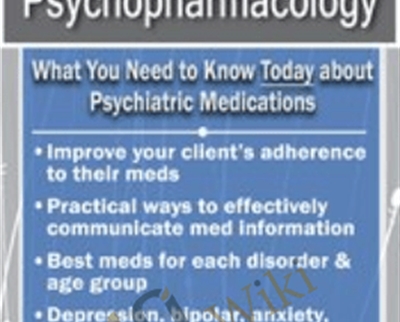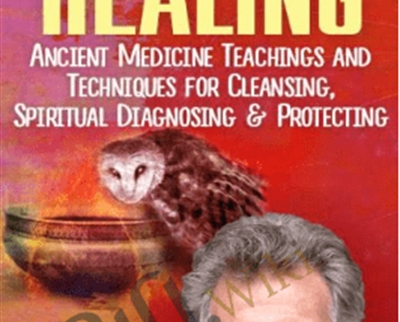Psychopharmacology-Meds: Myths and Realities – Frank Anderson, John Preston, Peter Kramer , Richard Simon, Robert Hedaya, Ron Taffel, Steven Dubovsky and Tom Smith
Original price was: $199.99.$56.00Current price is: $56.00.
Psychopharmacology-Meds: Myths and Realities – Frank Anderson, John Preston, Peter Kramer , Richard Simon, Robert Hedaya, Ron Taffel, Steven Dubovsky and T…
Salepage link: At HERE. Archive:
Despite the fact that so many clients take medications, many therapists feel intimidated by the medical and scientific aspects of psychopharmacology. It’s important to be informed about the current medications your clients are taking, to not only appropriately integrate meds and talk therapy, but also to promote adherence, help them deal with the possible side effects, and to determine if the current treatment plan is effective.
Join us for an in-depth look at psychopharmacology today, where the field’s leading experts reveal current best practices for combining talk therapy and psychopharmacology. You’ll learn new therapeutic methods for helping clients who aren’t responding to their meds or are conflicted about taking them. Plus, you’ll get up-to-date about the latest trends in medication management, including research on SSRIs and other commonly prescribed medications.
Don’t miss this online course that will expand your depth, range, and effectiveness as a therapist.
This comprehensive online course includes 6 lively interviews and 2 in-depth seminars:
Interviews
Session 1: How Therapy Can Enhance Psychopharmacology
Frank Anderson, M.D.
Learn how you can help clients derive more benefits from medications by:
- Distinguishing biology from psychology, and psychiatric symptoms from feelings
- Determining whether psychological factors, including attitudes toward authority and fear of losing symptoms, are blocking medication effects
- Empowering clients to take responsibility for their own medication decisions
- Teaching clients to listen to how various parts of themselves are responding to—and often resisting—their prescribed medication
- Tuning into your own attitudes and biases about meds
Session 2: In Defense of Antidepressants
Peter Kramer, M.D.
Reflect on what we’ve learned about SSRIs and depression over the past two decades, including:
- How to determine whether a client should be on medication
- What 25 years of clinical research has taught us about the effectiveness of antidepressants
- The often overlooked dangers of not providing sufficiently aggressive treatment for depression
- Whether SSRIs change personality as well as reduce symptoms
- What we’ve learned about how antidepressants actually affect serotonin and the brain
Session 3: The Great SSRI Debate
John Preston, Psy.D.
Explore the latest controversies about antidepressants and their effectiveness, including:
- What clinical conclusions can be drawn from the research on SSRIs and other antidepressants
- How to offer clients an informed perspective on the decision to go on medication
- The three types of psychotherapy shown to be most effective with depression
- How to prepare clients in remission for the possibility of recurrence
- How to involve clients’ families to increase compliance and improve treatment outcomes
Session 4: When Meds Don’t Work: A Troubleshooter’s Guide
Steve Dubovsky, M.D.
Explore an assessment procedure for determining the factors at work when medications don’t appear to be helping a client, including how to:
- Conduct an extended interview that gets at the vital, actionable information
- Distinguish various diagnostic dimensions crucial to prescribing the appropriate medications
- Assess issues of compliance, duration of med usage, and dosage
- Determine the role of family relationships and other psychological factors in lack of treatment progress
- Avoid common mistakes like changing meds at random, blaming the patient, and continuing ineffective medications
Session 5: Does This Kid Need Medication?
Ron Taffel, Ph.D.
Enhance your effectiveness in working with kids and teens by learning how to:
- Look for the key diagnostic signs that medications might be helpful, especially with symptoms of depression, anxiety, ADHD, and intense affective disorders
- Collaborate effectively with psychiatrists, especially in regards to day-to-day indications that a given medication is working or not
- Determine when interventions, both psychological and pharmacological, need to be changed
- Understand the key developmental issues in prescribing medications
- Address common parental concerns about medications and involve them in medication decision-making
Session 6: Whole psychiatry: Alternatives to Conventional Psychopharmacology
Robert Hedaya, M.D.
Learn how to treat the seven bodily systems that underlie many mental health issues without resorting to psychopharmacology by:
- Developing a simple clinical assessment procedure you can use without medical training
- Understanding the role of digestion and nutrition in many psychiatric symptoms
- Assessing the influence of lifestyle issues in clients’ clinical complaints
- Becoming knowledgeable about such factors as hormones, oxidative stress, free radicals, toxic substances, and various environmental influences
- Discovering how complementary treatments like acupuncture can play a role in treatment
Seminars
Psychopharmacology: What You Need to Know About Psychiatric Medications
Tom Smith, P.D., LMHC, NCP, FAPA, BCCP
Demands on mental health professionals to expand their knowledge of psychotropic meds are like never before… not only do you need to be on top of the latest developments and what is on the horizon, but you also have to take that information and use it most effectively for your client.
- Discuss the clinical uses of the five major psychotropic medication classes, how they work, and their common side effects.
- Describe the benefits, risks, safety factors and controversies associated with psychotropic medication in children and adolescents.
- Address the wide array of mental health disorders for which medications are frequently prescribed.
- Implement effective methods for collaborating with clients, families and prescribers.
- Recognize the ethical and legal issues in discussing medications with clients.
- Examine what’s coming next and emerging trends in psychopharmacology.
Using the DSM-5® for the Changing World of Psychopharmacology
Tom Smith, P.D., LMHC, NCP, FAPA, BCCP
The DSM-5® has significant changes in many diagnostic categories and has produced a profound impact on drug selection and treatments. It’s vital that all clinicians (even non-prescribers) know these changes and recognize opportunities to better serve their clients.
Investigate and understand the vast changes in learnable bites and through real applications and solutions for the new challenges in the field of psychopharmacology.
Here's an overview of the prominent keywords and a list of famous authors:
Business and Sales: Explore business strategies, sales skills, entrepreneurship, and brand-building from authors like Joe Wicks, Jillian Michaels, and Tony Horton.
Sports and Fitness: Enhance athleticism, improve health and fitness with guidance from experts like Shaun T, Kayla Itsines, and Yoga with Adriene.
Personal Development: Develop communication skills, time management, creative thinking, and enhance self-awareness from authors like Gretchen Rubin, Simon Sinek, and Marie Kondo.
Technology and Coding: Learn about artificial intelligence, data analytics, programming, and blockchain technology from thought leaders like Neil deGrasse Tyson, Amy Cuddy, and Malcolm Gladwell.
Lifestyle and Wellness: Discover courses on holistic health, yoga, and healthy living from authors like Elizabeth Gilbert, Bill Nye, and Tracy Anderson.
Art and Creativity: Explore the world of art, creativity, and painting with guidance from renowned artists like Bob Ross and others.
All the courses on WSOlib are led by top authors and experts in their respective fields. Rest assured that the knowledge and skills you acquire are reliable and highly applicable.
Specification: Psychopharmacology-Meds: Myths and Realities – Frank Anderson, John Preston, Peter Kramer , Richard Simon, Robert Hedaya, Ron Taffel, Steven Dubovsky and Tom Smith
|
User Reviews
Only logged in customers who have purchased this product may leave a review.

Original price was: $199.99.$56.00Current price is: $56.00.












There are no reviews yet.